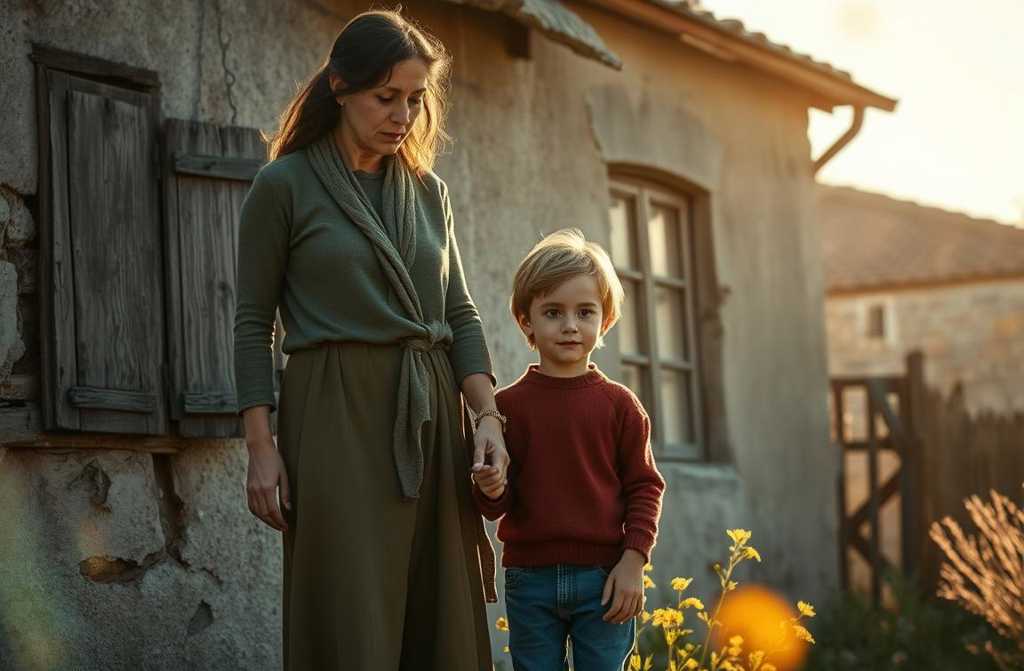My husband left me with our child in his ancient, half-collapsed cottage. He had no clue that beneath its creaking floorboards lay a hidden room filled with gold.
“Do you honestly think this place is fit for a child?” My eyes scanned the tilting walls, held together by little more than stubbornness and rusted nails.
“Emily, dont be dramatic,” James replied flatly, tossing the last bag onto the sagging porch. His tone was clipped, the irritation of a man forced to endure an inconvenient chore.
I stared silently at the papers in my hands. This cottage on the outskirts of a sleepy Yorkshire village, inherited from his grandfather, only mattered now because he wanted us gone. A decade of marriage ended not with tears, but with a cold transactiona “fair exchange,” as he called it.
Tom, my nine-year-old son, stood beside me clutching a worn-out teddy bearthe only toy hed grabbed when his father announced we were leaving. His eyes held the stunned confusion of a child whose world had been upended without warning.
“Sign here,” James said, handing me a pen with the same disinterest hed use when settling a restaurant bill. “No alimony, no claims. The cottage is yours outright.”
I signed. Not because it was fair, but because the London flat was in his parents’ name, and legally, I had no right to it. The alternative was nothing. And any support he mightve paid wouldve been laughable anyway.
“Good luck with your new life,” he tossed over his shoulder as he slid into his car. Tom flinched, as if about to speak, but the door slammed shut before he could.
“Itll be alright, Mum,” Tom said as the car vanished down the lane, kicking up dust. “Well manage.”
The cottage greeted us with groaning floorboards, the musty scent of damp, and cobwebs clinging to every corner. Gaps in the floor let in the chill, and the window frames were cracked and splintered. Tom squeezed my hand, and I knew there was no going back.
The first month tested every ounce of resilience. I kept my remote design job, but spotty Wi-Fi made deadlines a nightmare. Tom started at the village school, cycling there on a second-hand bike bought from a neighbour.
I learned to patch leaks, rewire sockets, and shore up sagging beams. At first, I hired a handyman with my dwindling savings. My once-manicured hands grew rough and calloused. Yet every evening, after Tom fell asleep, Id step outside and gaze at the starsbrighter here than theyd ever been in London.
“Dont lose heart, love,” Mrs. Wilkins told me one afternoon, after yet another burst pipe left me in tears. “This land rewards those who persevere. And you? Youve got grit.”
There was a quiet truth in her wordsone I understood better as I watched Tom bloom. He grew tougher, laughed more, his eyes bright with a newfound confidence. He befriended the local boys, babbling about tadpoles in the pond or helping old Mr. Dawson feed his chickens.
Nearly a year passed. The cottage slowly transformed: I repainted walls, replaced the roof with help from Dave, a builder down the lane (we couldnt afford professionals), and planted a small vegetable patch. Life settled, though it was far from easy.
Then came the day of the storm. Tom was on a school trip to York, and I finally tackled the cellar, dreaming of turning it into a workshop for crafting souvenirs to sell at the village fête.
The cellar was larger than Id realised. My torch revealed shelves crammed with junk, dusty crates, and jars. The air smelled of earth and rotting wood. I cleared space methodically, tossing what was useless.
When I shifted an old wardrobe, I spotted a narrow door camouflaged against the wallno hinges, just a rusted handle. Curiosity won. The door groaned open, revealing a cramped passage. At its end sat an iron-bound chest.
“What on earth?” I whispered, kneeling before it.
The lock crumbled at my touch. Insidecoins. Hundreds of gold sovereigns. Tarnished jewellery. Heavy ingots. My pulse roared in my ears as I lifted a coin. It was cold, weighty, stamped with the profile of a long-dead king.
“This cant be real,” I breathed, my fingers trembling. Had James known? Impossible. Hed never have handed over the cottage if hed suspected.
I covered the chest with an old blanket and hurried upstairs, locking the front door twice before calling Hannahmy university friend, now a solicitor specialising in property law.
“Hannah, you wont believe this,” I blurted. “I need you. Urgently. Can you come?”
“Emily? Whats wrong?” Her voice sharpened with concern.
“Its” I hesitated. “Just come. Please.”
For two days, I moved through the house like a ghost, jumping at every sound. Tom studied me over dinner.
“Mum, are you ill?” he asked when I absentmindedly salted his soup twice.
“Just thinking about work,” I lied, ruffling his hair.
Hannah arrived on Saturdaypolished, professional, in a crisp blazer despite it being the weekend. After my rushed explanation, she arched a brow.
“Either youre overtired, or youve struck literal gold. Show me.”
In the cellar, her torch beam caught the gleam of coins. She whistled.
“Bloody hell,” she murmured, picking one up. “These are genuine. And if that insignias right, theyre from the reign of George III. Emily, this is a fortune.”
“What do I do?” I hugged myself against the chill. “Can I keep it?”
She pulled out her phone, scrolling through legal texts.
“Under the Treasure Act, if its not deemed of significant cultural value, its yours. If it is, the Crown takes it but compensates you half its worth. Either way, you must declare it. Quietly.”
On Monday, we filed the paperwork. The night before the assessors arrived, I barely sleptwhat if they confiscated everything?
The team was small: a no-nonsense historian, a silent appraiser with a loupe, and a young bloke from the Yorkshire Museum. They spread the hoard on the table, murmuring, photographing, jotting notes.
“Right then,” the historian finally said, adjusting her glasses. “This appears to be a private collection from the late 1700slikely hidden during the Napoleonic Wars. A few pieces are noteworthy, but nothing of major historical interest.”
She handed me a document. “Its legally yours.”
After they left, Hannah hugged me. “Youre set! Now, lets be smart about this.”
I looked at my chapped hands, my frayed jeans, and couldnt process it.
We moved cautiously. Hannah knew an antiquities dealer in Bathdiscreet, ex-Sothebys. He examined the coins and whistled.
“In this condition? At auction, theyll fetch ten times their gold weight.”
When my bank balance grew substantial, I bought a new housenot a mansion, but a sturdy stone home with a garden and a sunny workshop.
Tom gaped at the wide staircase. “This is really ours?”
“Yes, love.” My throat tightened. “And I thought we might keep goats. Remember how you loved Mrs. Wilkinss?”
Soon, I bought adjacent land, hired locals, and built paddocks. Tom adored caring for the animals. I invested wiselyfarmland, trusts, a safety net. Not extravagance, but security.
Then, one autumn afternoon, a familiar car rolled up. James.
He looked haggard. “Rumours say you found gold. *My* grandfathers gold.”
I crossed my arms. “Your cottage. Your legal transfer.”
“Its my familys!” he snapped. “You owe me!”
“Problem, Emily?” Daves voice rumbled from the barn. He and Mr. Dawson stepped into view.
James paled, retreated to his car. “This isnt over.”
“Oh, it is,” I said softly. Hannah had seen to that.
That evening, Tom and I sat on the porch under a sky ablaze with stars.
“Mum,” he said, leaning against me, “youre the strongest person I know.”
I kissed his hair. The money meant nothing compared to this.
Years passed. Tom grew into a broad-shouldered man, studying agriculture at university. Our humble smallholding flourished into a proper farm, employing half the village.
Then came the day he burst in, eyes alight. “Mum, lets host a fête! Raise funds for the childrens hospital!”
The event was magicaltents, music, villagers laughing. Tom, now a natural leader, moved through the crowd effortlessly.
At days end, he handed me a small box. Inside was a signet ring from the chestthe first thing Id taken.
“For luck,” he said.
As the moon rose, we sat in contented silence. The ring gleamed on my fingera reminder that the greatest treasure wasnt gold, but the life wed







